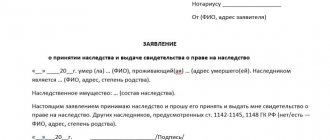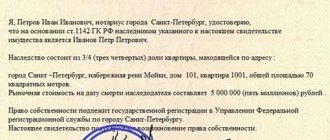Unfortunately, not everyone’s family life is going well. The married couple is separating, the father is not eager to take part in the lives of the children, pay alimony or include them among the heirs.
There may be several reasons.
For example, a parent leaves all marital property to his ex-wife or pays alimony as a one-time payment. Then he starts a new family and has children. And now he does not want the son or daughter from his first marriage to be heirs to property acquired after a divorce from their mother. It's only fair that the property go to his current family.
Sooner or later the question will arise: can children born in a first marriage claim their father’s property? And if so, how to exclude them from inheritance?
Determining heirs in a will
The circle of heirs can be limited. If a parent made a will during his lifetime, for example, in favor of a child born in a subsequent marriage, his other children born in his first marriage do not receive anything.
Note! If a will is drawn up in compliance with all legal norms, it can be challenged in court. It is necessary to provide reliable information that the testator systematically used alcohol or drugs, suffered from a mental disorder, or signed a document while under the influence of psychotropic drugs. Or prove that the testator was in difficult financial conditions, was deceived, threatened or used physical or psychological pressure. If the court revokes the will, the inheritance procedure will be carried out in order of priority.
Thus, if a parent wishes to leave an inheritance to a son or daughter from a second marriage, it is necessary to draw up a will. Do everything legally correctly so that no one can challenge it in the future.
Can illegitimate children claim the property of a deceased father?
From the legal side, such a question is not considered correct. In our legislation there is no division between children who were born in the legal marriage of their parents and those who were born in a common-law family.
Children of both categories are equal in their rights in relation to the parent, this also applies to receiving an inheritance. But it’s still worth paying attention to some points.
To be sure that a child whose parents have not formalized the relationship can count on an inheritance, it is necessary to remember on what principle property is inherited. As part of the will, material assets are guaranteed to be transferred to persons from the list of recipients.
The testator decides who will be on this list. It also happens that the biological father does not include children in this list. If the receipt of valuables is considered in the order of legal priority, then a completely different mechanism is provided here.
The first priority includes parents, spouses and children. The regulatory documents say nothing about the category of children who could be limited in receiving an inheritance.
Consequently, illegitimate children can count on receiving the material assets of the deceased father.
The moment of proving the child’s relationship with the deceased father is also important, implying the establishment of paternity.
There will be no problems if the birth certificate contains information about both parents. The difficulty arises when the father does not want to recognize his parental rights. In such circumstances, relationship can be proven through court.
There are cases in judicial practice when recognition of paternity occurs after the death of a parent. When it comes not only to recognition of paternity, but also to obtaining the right to claim an inheritance, you need to file a claim in the interests of a child who was born in a common-law family and is a potential heir.
A genetic examination may also be ordered by the court if it helps to identify circumstances for resolving a civil case.
For examination, fingerprints are taken from the grandmother or grandfather, but other relatives may also be involved . After all the procedures, the court issues a decision recognizing paternity.
Next, the court decision must be presented to the registry office to register the established fact. This will be the basis for an illegitimate child to receive an inheritance.
Children-heirs with the right to a mandatory share
But even if the testator correctly draws up the document, categorically expresses his will, and disinherits children born in his first marriage, they will still be able to receive part of the property.
We are talking about a compulsory share, which priority minors or disabled legal successors - children, parents, spouse - have the right to claim.
If the testator’s child, born in his first marriage, has not reached the age of majority or is disabled (disabled, pensioner) on the day of opening the inheritance, he is entitled to a mandatory share of the inherited property. The size of the share is at least ½ of the part of the property assigned to such a legal successor in accordance with the law.
We talked more about how inheritance by law occurs here.
Consequently, the presence of a will does not always guarantee that the child will be deprived of inherited property. But only if he has not reached the age of majority or is disabled.
But what is the queue of heirs or the order of priority?
This procedure is just appropriate when inheritance occurs according to law.
The heirs are:
- First stage;
- Second stage;
- Third stage;
- Heirs of subsequent queues.
If there are no heirs of the first stage, or they are recognized as unworthy, or everyone has refused the inheritance, then the heirs of the second stage enter into the inheritance. If there are no heirs of the first and second orders, then the heirs of the third order enter into the inheritance, etc.
We will not consider each line of heirs, I will only say what is important for us in relation to the article.
The heirs of the first stage are the spouse, children and parents of the testator. First-priority heirs inherit first after the death of the testator and divide the property in equal shares.
That is, it turns out that changing the legal order of inheritance can only be done by a will; if there is a will, then inheritance occurs only in accordance with the will, and if there is no will, then in a legal manner.
That is, we came to the conclusion that children from the first marriage are heirs of the first line, it does not matter whether the father and mother of these children are married or not.
Unworthy heir
There is another possibility to deprive a child born in the first marriage of the inheritance property - to recognize him as an unworthy heir.
In Art. 1117 of the Civil Code of the Russian Federation determines who is an unworthy heir. If we are talking about a child born in a first marriage, then the basis for recognizing him as an unworthy legal successor is...
- committing a criminal offense against the testator (father, mother) or against other heirs (brothers, sisters, parents of the testator, etc.);
- an obstacle to the execution of the will of the testamentary parent;
- illegal increase of one's share of inherited property;
- failure to fulfill the obligation to provide for a disabled and needy father (or mother).
Both the legal heir and those indicated in the will are considered unworthy. A legal successor who claims an obligatory share can also be disinherited.
Note! A statement of claim to declare heirs unworthy can be filed not only during the inheritance procedure. There are situations when the basis for a judicial appeal appears much later. In any case, a three-year limitation period must be observed, which begins to count from the moment the person learned (or was able to learn) about the violation of his rights.
In this article we talked about the statute of limitations in inheritance law.
If the court finds the heir unworthy, and the inheritance has already been re-registered, the latter will be obliged to return the received property.
Order of succession by law
The legislator has provided two grounds for accepting an inheritance (Article 1111 of the Civil Code of the Russian Federation):
- According to the will. The testator independently decides to whom to assign his property, indicates the shares of the applicants, and deprives one of the relatives of property rights. His expression of will is limited only by the rule on the obligatory part. The law protects the rights of socially vulnerable categories of citizens.
- In law . The heirs accept the property in order of priority. The family members of the deceased subject speak first. This includes daughters, sons, parents, living spouse. In the absence of heirs of the first priority or their refusal of the property, the right is transferred to the recipients of the next priority. The second line of heirs includes brothers and sisters, grandparents. Full and non-full relatives are taken into account. According to this principle, the right to property is transferred to all blood relatives of the deceased. In their absence or refusal, the property is considered escheated and transferred to the ownership of the state.
Property subject to inheritance
Since our article deals with the inheritance of property by children born in the first marriage, a logical question arises: what property can be included in the inheritance?
After all, if the testator has registered a new marriage, then everything that was purchased in the subsequent marriage is joint and belongs to the spouses under the right of joint ownership. And it doesn’t matter with what funds it was purchased and who is the title owner. One half of the property belongs to the spouse, the other half to the wife.
If one of the representatives of a married couple dies, the estate will include half of the joint property, as well as property that is the personal property of the deceased (inherited, gifted).
Thus, not everything that was purchased by a parent in subsequent marriages can be claimed by a child born in the first marriage.
Deadlines for accepting an inheritance
Heirs must contact a notary within six months from the date of death of the testator. If the deadline has been missed, it can only be restored through the court if the following factors are present:
- Ignorance of a citizen about his inclusion in the circle of heirs under a will, or about the death of the testator.
- The successor's stay on a business trip abroad or for long-term treatment in a medical institution.
- Other valid reasons.
Expert commentary
Gorbunova Olga
Lawyer
Also, persons who missed the deadline for entering into an inheritance can receive it peacefully by obtaining the consent of other heirs who have used their legal right to acquire the inherited property.
Let's look at two common examples:
Option 1: restoration of deadlines in court. Yumashov S.V. was supposed to receive half of the apartment after the death of his father according to the will. In addition to him, the circle of heirs included a son from his second marriage. Yumashov S.V. at the time of opening the inheritance case, he was on a business trip in France and could not leave the country until the end of his service contract. Because of this, they missed the deadline for accepting the inheritance. Upon returning home, Yumashov S.V. I tried to negotiate with my brother about a voluntary division of the apartment, but was refused. Then he filed a lawsuit to restore the terms, attaching to it the title documents and a copy of the employment contract, which indicated the terms of service in France, as well as the fact that the citizen could not leave the country until the end of the contract.
The court, taking into account the arguments presented, decided to satisfy the plaintiff’s request and allocate him a share in the real estate according to the will.
Option 2: peaceful restoration. In Afanasyev N.M. in his first marriage a daughter was born, he later married another woman, and two sons were born. He drew up a will, according to which his house is inherited by all three children in equal shares. Daughter of Afanasyev N.M. I didn’t have time to contact a notary due to being treated in a hospital with subsequent rehabilitation at a medical center. After discharge, she made an agreement with her brother and sister. All three visited a notary, who canceled the previously issued certificates and issued new ones, on the basis of which the property was registered as shared ownership.
How to disinherit a child from a first marriage?
Let's summarize: it is quite possible to deprive a child born in the first marriage of the inheritance property. For this you can…
- Draw up a will in which you designate specific relatives as heirs. All others will be deprived of the right to inherit.
If the disinherited child is a minor or disabled, he will in any case receive the obligatory share. It should be remembered that failed successors can appeal the will of the owner and cancel the will.
- To recognize in court a child from a first marriage as an unworthy heir. But this requires the grounds that we mentioned earlier.
- Issue a deed of gift for the child. In this case, personal property or part of the joint property of the spouses donated to other persons (the second spouse, a child born in the second marriage) will not be included in the inheritance mass.
In this case, there is a risk of losing the roof over your head during your lifetime. After signing the deed of gift, not only other relatives, but also you yourself lose the right to own, manage and use the property. Carefully weigh all the pros and cons, and only then make a decision.
If you want to find out which is better and cheaper to draw up – a will or a deed of gift, read our previous article.
Facebook
If the father/mother has been deprived of parental rights
When parents lose their rights in relation to their children by a court decision, the rights of the child are not affected. The latter, under such circumstances, inherit values by law and by will. The same will apply to adopted children who, after completing the adoption process, become their own.
A child will not be considered an heir if, after deprivation of the rights of his biological parents, he was adopted by other persons. But there are exceptions here too:
- the son or daughter continues to communicate with the biological parents;
- this fact was considered and established by the court.
Sometimes guardianship authorities enter into an agreement under which minors can live in a foster family. But in this case, neither the guardian nor the guardians have rights and obligations, like children and parents.
Amount of state duty for ex-husband
The cost of state duty is one of the key points in the issue of inheritance. The amount of the fee depends on the degree of relationship with the deceased citizen.
The law provides for a reduced fee for spouses, children, parents, sisters and brothers. It is 0.3% of the value of the inheritance.
However, the ex-husband is not included in the list of beneficiaries. When entering into an inheritance under a will, he must pay 0,6%.
A similar rule applies to dependents. For example, if the former spouse was supported by the testator. He pays a state duty of 0.6% of the value of the property.
Can an ex-husband be a dependent?
If there is a will, its provisions are taken into account. Regardless of who the property of the deceased is assigned to, the notary must find out whether there are any obligatory heirs among the applicants.
One of them may be a disabled dependent. For example, ex-spouse. A disabled dependent is entitled to ½ of the share that is due to the heir by law.
If the testator did not have time to draw up a will, then the property will go to the relatives in order of priority. Dependents are called upon to inherit on an equal basis with other relatives of a deceased citizen (Article 1148 of the Civil Code of the Russian Federation). Basic requirements are the presence of an appropriate status and cohabitation with the testator for more than 1 year .
Children's rights in the event of parental divorce
Unlike spouses, children do not lose property rights against their parents after their divorce. And it doesn’t matter which of them the child ends up living with.
Children can inherit property after their father or mother as 1st line . The rule applies even if one of the former spouses is deprived of parental rights.
You can change the inheritance order:
- by making a will;
- if the child was adopted without preserving personal non-property and property rights;
- if the child is recognized as an unworthy heir.
What rights do adopted children have? When making a court decision on adoption, the key point is the preservation/refusal to preserve property and personal non-property rights (Article 137 of the RF IC).
If the rights of a minor are preserved, then he can be the heir of his blood parent. Otherwise, the child is deprived of the right to inheritance.
After the court decision enters into legal force, the adopted child is equated to blood relatives. Adopted children inherit property after their adoptive parents as 1st line (Article 1147 of the Civil Code of the Russian Federation).
If children have not reached the age of majority, their interests are represented by legal representatives (parents, guardians). The rule applies even in the event of divorce between spouses. An application for acceptance of an inheritance in the interests of young children is submitted by the ex-husband or wife.
The procedure for registering an inheritance after the death of parents
All applicants for inheritance must contact a notary or actually accept the property. This must be done within 6 months from the date of opening the inheritance case (from the moment of death of the giver).
When contacting a notary to draw up a certificate of inheritance, you must write an application. This can be done either at home or with a lawyer. Along with the application, you need to prepare a package of documents, which includes the following papers:
- Death certificate (issued by the local registry office upon availability of an extract from the hospital).
- An extract about the place of registration of the deceased and his deregistration at the place of residence.
- A will (if available) or documents indicating that the successor belongs to a certain category of relatives.
In addition to the documents described above, you must also provide the notary with papers indicating the ownership of the testator. Depending on the type of property, the set of papers will be as follows:
- For an apartment: certificate of ownership, extract from the Unified State Register, purchase and sale agreement (exchange, gift), cadastral and technical passports.
- For a car: certificate of ownership, title, car purchase agreement.
- For deposit: bank agreement of the deceased, his savings book.
For other property, the notary will give detailed explanations about what papers need to be prepared. Remember that each type of property of the deceased must be assessed and the appraisal document must be provided to the notary when registering the entry.
Nuances of the inheritance procedure
Even if the deceased parent was deprived of his parental rights in relation to the child, the latter retains legal rights to inherit the property of the father or mother, who are the testators. However, there is an exception to this rule regarding adopted children.
In this case, there are no property rights related to receiving a share of the inheritance. Even if the child is illegitimate, he has the same rights as children born in a legal marriage, but the fact of consanguinity must be proven in a judicial body.
If the child is a minor, he must acquire inheritance rights with the help of a legal representative:
- if he has not yet reached 18 full years of age, his legal representative must draw up an application for receipt of an inheritance to a notary;
- if over 14 but under 18 years of age, the child can sign the application independently, but with the written and notarized permission of the representative.
Official legal representatives of minors include the following persons:
- trustee;
- guardian;
- adoptive parent;
- parent.
A child or his representative is able to refuse a share of the inheritance if its acceptance is contrary to the interests of the heir.








